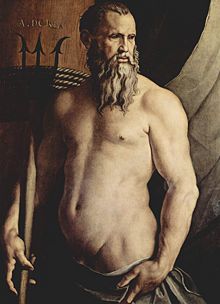Difference between revisions of "Neptune (mythology)" - New World Encyclopedia
(added category) |
(imported and credit article from wikipedia) |
||
| Line 1: | Line 1: | ||
| + | '''Neptune''' ([[Latin language|Latin]]: ''Neptūnus'') is the god of the sea in [[Roman mythology]]. He was a relative of Ceres. He is analogous but not identical to the god '''[[Poseidon]]''' of [[Greek mythology]]. The Roman conception of Neptune owed a great deal to the [[Etruscan mythology|Etruscan god]] [[Nethuns]]. | ||
| + | |||
| + | Originally he was an Italic god paired with [[Salacia]], possibly the goddess of the salt water. At an early date (399 B.C.E.) he was identified with the Greek [[Poseidon]], when the [[Sibylline books]] ordered a [[lectisternium]] in his honour ([[Livy]] v. 13). | ||
| + | |||
| + | In earlier times it was the god [[Portunes | Fortunus]] who was thanked for naval victories, but Neptune supplanted him in this role by at least the 1st century B.C.E., when [[Sextus Pompeius]] called himself "son of Neptune". | ||
| + | |||
| + | His festival, [[Neptunalia]], at which tents were made from the branches of trees, [[July 23]]. He had two temples in Rome. The first, built in 25 B.C.E., stood near the [[Circus Flaminius]], the Roman racetrack, and contained a famous sculpture of a marine group by [[Scopas]]. The second, the Basilica Neptuni, was built on the [[Campus Martius]] and dedicated by [[Agrippa]] in honour of the naval [[Battle of Actium|victory of Actium]]. | ||
| + | [[Image:Angelo Bronzino 048.jpg|thumbnail|220px|left|'' Genoese admiral [[Andrea Doria]] as Neptune, by [[Agnolo Bronzino]]''.]] | ||
| + | Neptune was associated as well with fresh water, as opposede to [[Oceanus]], god of the world-ocean. | ||
| + | |||
| + | Like Poseidon, Neptune was also worshipped by the [[Roman mythology|Romans]] as a [[horse]] god, under the name [[Neptune Equester]], [[patron god|patron]] of horse-racing. | ||
| + | |||
| + | ==References== | ||
| + | *{{1911}} | ||
| + | |||
| + | [[Category:Roman gods]] | ||
| + | [[Category:European mythology]] | ||
| + | [[Category:Sea and river gods]] | ||
| + | [[Category:Animal gods]] | ||
| + | {{Euro-myth-stub}} | ||
| + | |||
| + | [[da:Neptun (gud)]] | ||
| + | [[de:Neptun (Mythologie)]] | ||
| + | [[es:Neptuno (mitología)]] | ||
| + | [[fr:Neptune (mythologie)]] | ||
| + | [[it:Nettuno (divinità)]] | ||
| + | [[he:נפטון (מיתולוגיה)]] | ||
| + | [[la:Neptunus (deus)]] | ||
| + | [[mt:Nettunu (mitoloġija)]] | ||
| + | [[nl:Neptunus (godheid)]] | ||
| + | [[ja:ネプトゥヌス]] | ||
| + | [[pl:Neptun (bóg)]] | ||
| + | [[pt:Neptuno (mitologia)]] | ||
| + | [[ru:Нептун (мифология)]] | ||
| + | [[fi:Neptunus (jumala)]] | ||
| + | [[sv:Neptunus (mytologi)]] | ||
| + | [[zh:尼普东]] | ||
| + | |||
| + | |||
[[Category: Philosophy and religion]] | [[Category: Philosophy and religion]] | ||
[[Category: Religion]] | [[Category: Religion]] | ||
| + | |||
| + | {{Credit|128069787}} | ||
Revision as of 18:32, 7 May 2007
Neptune (Latin: Neptūnus) is the god of the sea in Roman mythology. He was a relative of Ceres. He is analogous but not identical to the god Poseidon of Greek mythology. The Roman conception of Neptune owed a great deal to the Etruscan god Nethuns.
Originally he was an Italic god paired with Salacia, possibly the goddess of the salt water. At an early date (399 B.C.E.) he was identified with the Greek Poseidon, when the Sibylline books ordered a lectisternium in his honour (Livy v. 13).
In earlier times it was the god Fortunus who was thanked for naval victories, but Neptune supplanted him in this role by at least the 1st century B.C.E., when Sextus Pompeius called himself "son of Neptune".
His festival, Neptunalia, at which tents were made from the branches of trees, July 23. He had two temples in Rome. The first, built in 25 B.C.E., stood near the Circus Flaminius, the Roman racetrack, and contained a famous sculpture of a marine group by Scopas. The second, the Basilica Neptuni, was built on the Campus Martius and dedicated by Agrippa in honour of the naval victory of Actium.
Neptune was associated as well with fresh water, as opposede to Oceanus, god of the world-ocean.
Like Poseidon, Neptune was also worshipped by the Romans as a horse god, under the name Neptune Equester, patron of horse-racing.
ReferencesISBN links support NWE through referral fees
- This article incorporates text from the Encyclopædia Britannica Eleventh Edition, a publication now in the public domain.
Template:Euro-myth-stub
da:Neptun (gud) de:Neptun (Mythologie) es:Neptuno (mitología) fr:Neptune (mythologie) it:Nettuno (divinità) he:נפטון (מיתולוגיה) la:Neptunus (deus) mt:Nettunu (mitoloġija) nl:Neptunus (godheid) ja:ネプトゥヌス pl:Neptun (bóg) pt:Neptuno (mitologia) ru:Нептун (мифология) fi:Neptunus (jumala) sv:Neptunus (mytologi) zh:尼普东
Credits
New World Encyclopedia writers and editors rewrote and completed the Wikipedia article in accordance with New World Encyclopedia standards. This article abides by terms of the Creative Commons CC-by-sa 3.0 License (CC-by-sa), which may be used and disseminated with proper attribution. Credit is due under the terms of this license that can reference both the New World Encyclopedia contributors and the selfless volunteer contributors of the Wikimedia Foundation. To cite this article click here for a list of acceptable citing formats.The history of earlier contributions by wikipedians is accessible to researchers here:
The history of this article since it was imported to New World Encyclopedia:
Note: Some restrictions may apply to use of individual images which are separately licensed.
